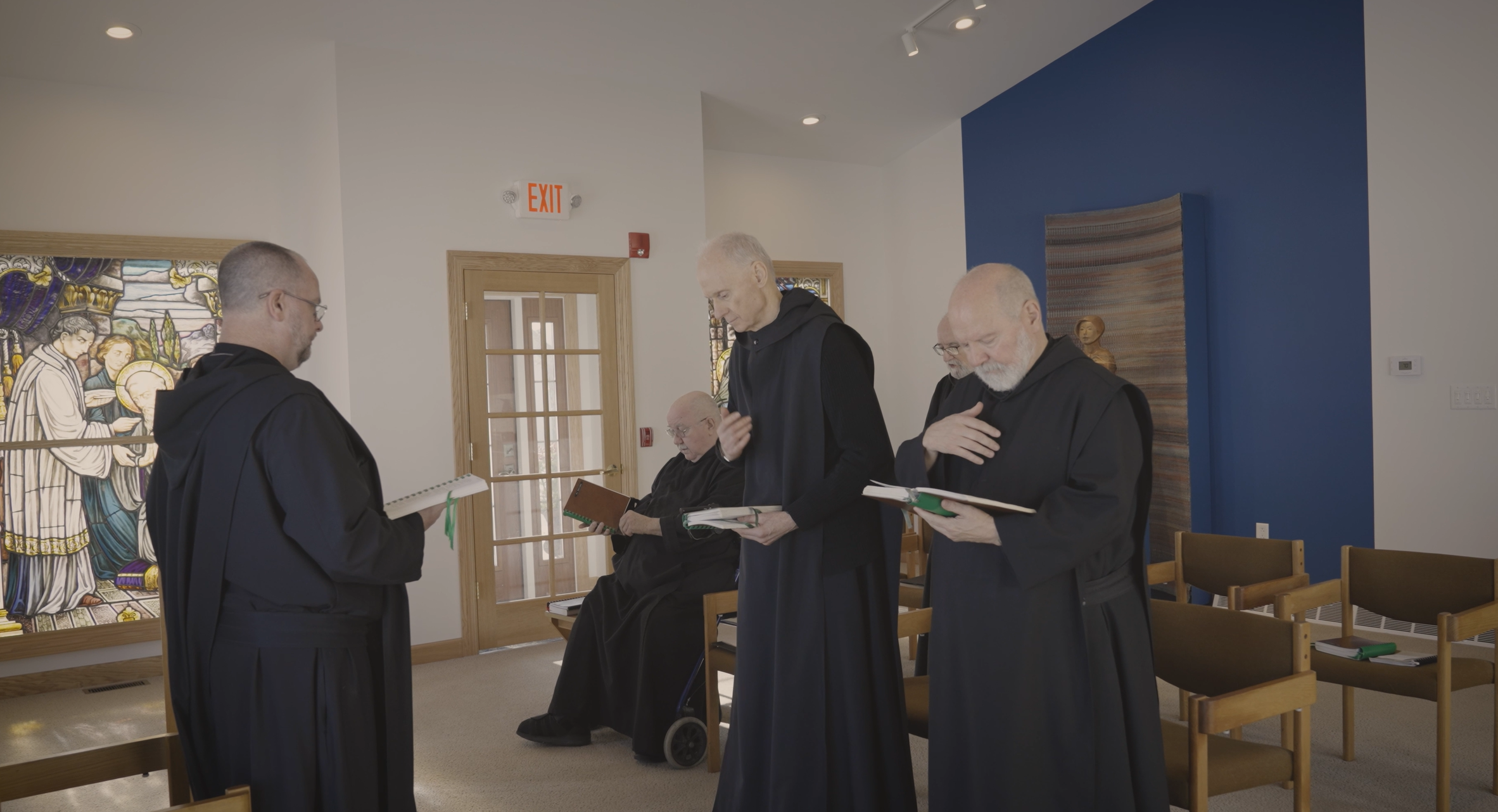Who are the Benedictines?
The defining features and values of the order—at Saint Bede and beyond
When a man seeks to answer the question “how do I become a monk,” it’s key that he understands what shapes the Benedictine order—and sets it apart from other calls to serve.
These Benedictine values are the same one practiced here at our monastery in Illinois. While monastic life may be shrouded in mystery for those unfamiliar, it’s essential to get a full understanding of monastic life as they discern their next step that can lead them to St. Bede or another monastery.
Rule of St. Benedict: the heart of Benedictine life
This guidebook for communal living is based on principles of humility, obedience, stability, and balance—the same values we see in Benedictine life today. In short, it is the framework for spiritual growth and discipline.
Ora et Labora: Prayer and work
By upholding both as a value, it underscores the importance of balancing prayer and manual labor as integral parts of a monk's daily life. For example, monks’ prayer includes daily liturgical prayer, like the Divine Office. And manual labor might include activities like farming, hospitality, education, and craftsmanship. Within a monastery, work is seen as a form of worship and a means of sustaining the community.
Humility: A foundational value
As with many orders, Benedictine monks are called to recognize their own limitations and dependence on God. Ultimately this is seen a pathway to holiness, a deeper union with God, and way of achieving communion with others.
In short, the Benedictines seek to become a vessel of God’s grace and instruments of his love. St. Benedict states in the Rule that monks should "prefer nothing to the love of Christ" (RB 4:21). This love of Christ can be manifested in the mutual obedience monks show to one another: “Obedience is a blessing to be shown by all, not only to the abbot but also to one another as brothers, since we know that it is by this way of obedience that we go to God” (RB 71:1-2).
The practice of humility begins by recognizing God’s grace. A Benedictine monk understands that all their gifts and talents come from God. They are called to use them for the service of others rather than for their own glory. Likewise, they must also recognize the gifts of others.
There is also an element of detachment from self-will, in favor of embracing God’s will. Monks understand that this must come even when it contradicts our own desires or preferences.
Stability: The basis for community
For the Benedictines, stability refers to a rootedness in their community. They are called to commit to a singular monastery for life, unless there is a compelling reason to relocate.
This commitment fosters a sense of continuity and faithfulness to the vocation. It’s a stable environment so that they may continue to cultivate virtues. Finally, this stability, over years, allows a monk to become a witness to perseverance and God’s faithfulness.
Community: Living and growing together
In committing to a monastery, community becomes a central aspect of Benedictine life. It is a means of living out the Gospel and making their love of God and neighbor more tangible through shared prayer, work and fellowship.
Living together in intentional fellowship provides a supportive environment as all monks move forward in their spiritual journeys. There is a sense of mutual accountability and discernment, which each monk helps each other stay faithful to their commitment to God.
Benedictine monasteries bring together individuals from different backgrounds and walks of life. That diversity, in fact, creates a sense of unity. It also allows for monks to cultivate mutual respect, understanding and acceptance. They are more readily able to recognize the inherent dignity and worth of each person.
Hospitality: Following Christ’s example
Benedictines are perhaps best known for their tradition of welcoming guests with warmth and openness. It’s a practice rooted in biblical tradition, with numerous passages emphasizing the importance of welcoming strangers and showing kindness to travelers
Jesus, of course, exemplifies hospitality by reaching out to the marginalized and inviting all to share in the abundance of God's love. Hospitality, therefore, can be understood as a spiritual practice.
But it’s not just about sharing resources. It’s also about the sharing of company, conversation, dialogue. Through a meal, a conversation, or acts of mutual service, we are able to recognize our common humanity—and God’s presence in one another.
Obedience: Life under an Abbot
Obedience, first and foremost, is understood as a submission to God’s will. Within a monastery, monks are willingly following the authority of the Abbot and the communal way of life outlined in the Rule of Saint Benedict.
The Abbot is the spiritual leader of the monastic community. It’s a position of responsibility that supports the spiritual welfare of the entire monastery. He is entrusted with guiding its members on the path of holiness.
More broadly, obedience is the first step on the path to humility and spiritual growth—as well as a framework for obedience.
Perhaps paradoxically, monks don’t see obedience as a restriction to freedom. Rather it is a pathway to true freedom. When a monk surrenders to the will of God, he can find liberation from the tyranny of selfish desires and attachments. And from there, he can experience a deeper union with God and a greater sense of inner peace and fulfillment.
Moderation: In all things
The Rule of Saint Benedict advocates for a balanced and moderate approach to all aspects of life—including food, drink, work, and prayer. This is a call to serve as witnesses to a balanced, well-ordered life.
This takes many forms across all aspect of monastic life. Of course, that includes temperance in material possession. Monks live simply and frugally. They also practice discipline in personal practice, with a structured schedule of prayer, work, and rest. These roots of monastic life create more opportunities for spiritual growth.
There is even moderation in speech. Monks avoid gossip, slander, and other forms of harmful speech. And this creates an atmosphere of peace and harmony.
In practicing moderation, the body is cared for and seen as a temple of the Holy Spirit. Monks will avoid excessive indulgence in food, drink, or other sensual pleasures as a means of achieving this.
And perhaps most surprisingly, monks even practice spiritual moderation. They avoid excessive zeal or spiritual pride. Instead, they embrace a balanced approach to prayer and devotional practice, balancing both contemplation and action.
Benedictine values at Saint Bede Abbey in Illinois
Here at our monastery in Illinois, you’ll see all of these practices and values come to life. If you’re interested in how to become a monk, please do reach out to us and fill out our contact form, linked here.



